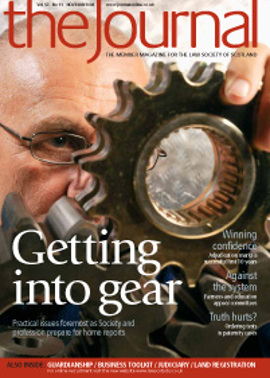Cohabitation update
Family lawyers wait with trepidation as each crumb of commentary on the interpretation of s 28 of the Family Law (Scotland) Act 2006 is reported. It is disappointing that there are such slim pickings more than two years after enactment of this groundbreaking statute.
This summer we had two cases widely heralded as the first of a plethora to come. Fairley v Fairley [2008] CS08 104 (Lord McEwan, 18 July 2008) met with a fanfare of publicity, but look closer and you will see that the judgment is merely a date of separation finding which was crucial to Ms Fairley establishing that the 2006 Act could apply. The decision is of little interest to the profession at this stage, but there is no doubt that if Fairley proceeds to a conclusion it will have all the ingredients to potentially produce a juicy precedent. That is, however, unlikely to be much before mid-2009. Sadly, like many other cases, it may well fall victim to economics.
CM: the claim
CM v STS [2008] CSOH 125 (2 September 2008) did give consideration to how a court would consider a claim under s 28. CM had cohabited with STS for eight years and there were two children of that relationship. CM had suffered a diminution of income, pension and career progression in order to work part time and raise the children, while STS pursued full time employment and bettered his earning capacity through further education. CM sought a capital payment of £50,000 under s 28(2)(a), arguing that she had suffered economic loss, and a further £20,000 under s 28(2)(b) to reflect the burden of care of the children.
CM led much evidence about her loss in monetary terms. It was, however, accepted that STS had contributed to all of the household bills, and for a number of years while CM was not working, paid the entire mortgage repayments, including a further advance to extend the property (which was in her name). STS had assisted in the conversion, utilising his professional skills in obtaining the necessary permissions. A party litigant, STS gave evidence that he believed CM’s property had risen in value by £120,000 whereas he had left the relationship with no assets. CM argued that STS’s contributions were merely alimentary in nature and had also benefited him. She rejected the suggestion that they were real economic contributions.
The court’s approach
Lord Matthews made certain findings regarding the calculations produced, halving those figures in accordance with the principle that the burden of cohabitation should be shared fairly between the parties. He considered that although s 28 was about making a financial award and s 9(1)(b) of the Family Law (Scotland) Act 1985 was about sharing property, the principles applied in economic advantage/ disadvantage claims were the same. He carried out a balancing exercise, concluding that STS’s contributions to the mortgage effectively balanced out any economic loss that CM had suffered. He refused to make any order under s 28(2)(a) and broadly criticised the presentation of CM’s case for its absence of evidence of the current value of her home, which he thought demonstrated a lack of candour on her part, and for the failure to cross examine STS more closely on his income in order to elicit evidence of resources.
CM had argued that the 2006 Act did not require the court to give consideration to the issue of resources. Lord Matthews did not think that the absence of reference to resources in the Act necessarily meant that a court would rush to make an order which would be plainly unenforceable.
The judge questioned why the Act seemed to require a prediction of future childcare costs, instead of simply providing a mechanism to recover periodical payments which could be varied from time to time as required. However there is no such provision for married couples who have children either and this is precisely what requires to be done in s 9(1)(c) cases, which is perhaps why it was not thought appropriate to depart from this for cohabitants.
After questioning whether the measure of the economic burden of care is the diminution in capacity or the predicted childcare costs, Lord Matthews plumped for childcare costs and, concluding that future costs would be £26,000, applied the same principle of sharing the burden equally, awarding CM £13,000 payable by instalments.
Economic question
There is little doubt that had STS not been a party litigant, this decision might have produced a more in-depth analysis of economic advantage and disadvantage arguments within the context of s 28. It does however also seem to suggest that s 28 is unlikely to produce any significant capital awards for cohabitees, and that at this level the economics will militate against many of these claims proceeding to court, which perhaps explains the dearth of decisions to date.
In this issue
- Support where it's needed
- Prevention or cure?
- Gearing up for change
- A time for support
- Foreign companies and the Registers
- Sensitive relations
- New course for the courts
- Adjudication – 10 years on
- Jack's story
- Professional Practice Committee
- Sourcing our future
- Data security begins at home
- Going equipped
- Bonus round
- Nothing But Delivery
- Checking out checklists
- The final word
- Redundancy: an age old issue?
- Cohabitation update
- Inventive judging?
- Scottish Solicitors' Discipline Tribunal
- Website review
- Book reviews
- Beating the credit crunch
- Keeping a clean sheet
- Battening down in buy-to-let






